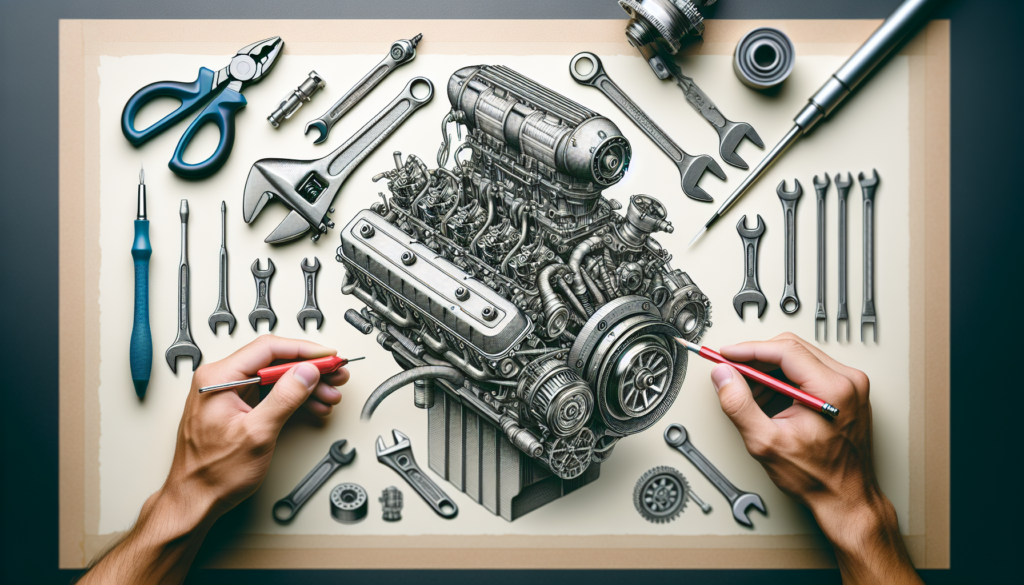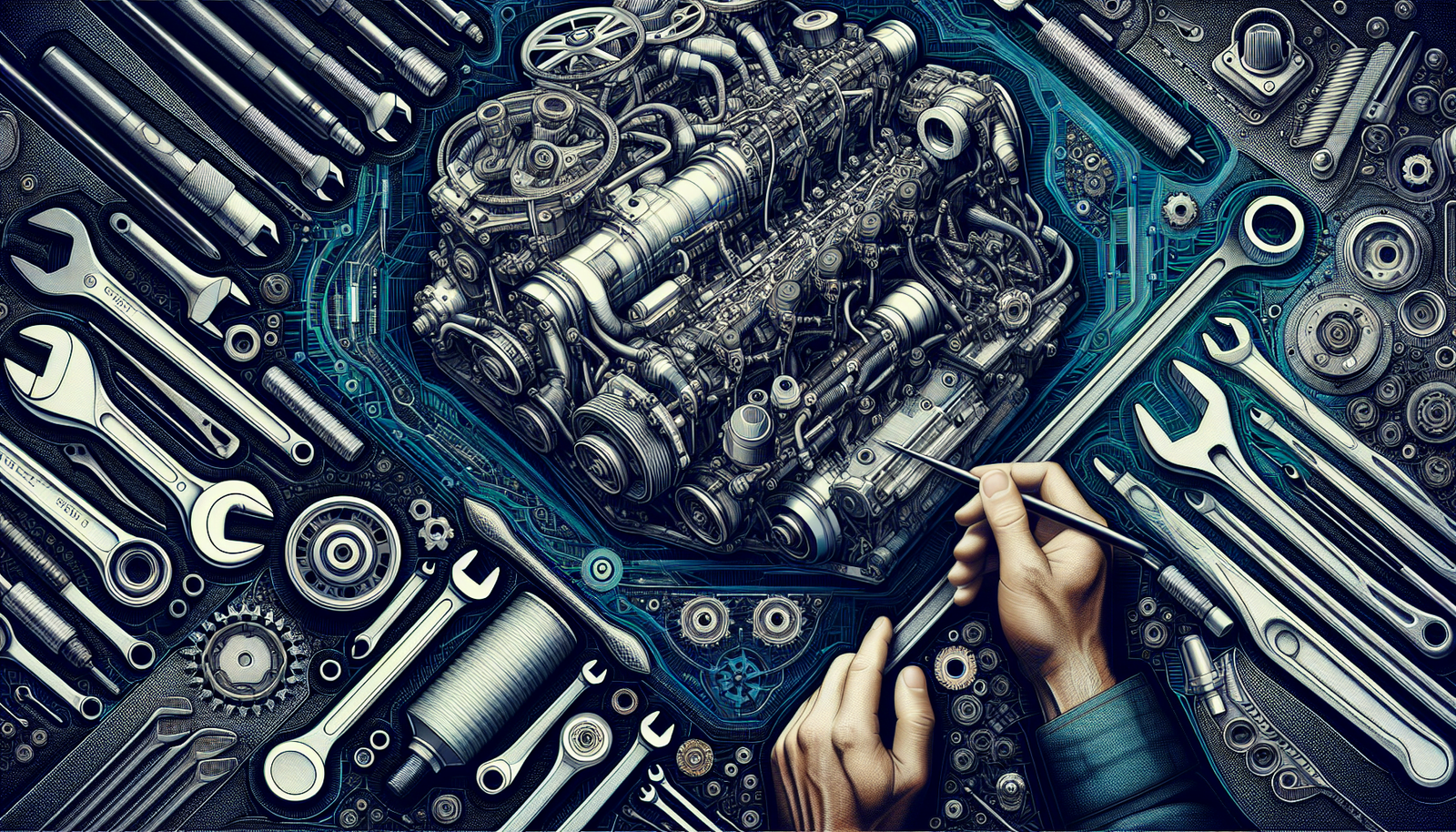Ahoy, sailor! I bet you love getting out on the water as much as the next guy. But keeping your boat in ship shape is crucial to ensuring those weekend getaways remain fun and stress-free. In the following piece, “Essential boat engine maintenance Checklist,” we’re offering you handful tips and guidelines for regular upkeep of your boat’s engine. This guide will ensure you’re never left stranded in the middle of water due to an engine that’s given up the ghost. So, brace yourself to learn how to keep your vessel’s heart beating strong for years to come.
Understanding the Importance of Boat Engine Maintenance
Operating a boat is not as simple as hopping on and sailing away into the sunset. When it comes to the performance of your boat, consistent engine maintenance takes the helm.
The role of engine maintenance in boat performance
The condition of your engine can make the difference between an enjoyable day out on the water and being stranded at sea. Regular engine maintenance ensures optimal performance, smooth operation, and improves fuel efficiency. It preserves the power and speed of your boat, allowing you to navigate safely and fluidly in various water conditions.
Potential risks of neglecting boat engine maintenance
Neglecting boat engine maintenance can lead to a variety of problems, some of which can be quite serious. From poor fuel economy and performance issues to engine failure and costly repairs, lack of maintenance can lead to issues that could have been easily avoided. Worse, it can compromise your safety and those on board due to sudden break downs or malfunctions in the middle of the water.
Impact of routine maintenance on boat engine lifespan
Consistent maintenance goes beyond immediate performance; it enhances the overall lifespan of your boat engine. Through regular checks, you identify and address minor issues before they escalate into significant problems that can damage your engine permanently. As a result, your engine remains reliable and functional for many more years than it would have without routine care.
Familiarize Yourself with Basic Engine Parts
Before beginning any engine maintenance, it’s crucial to familiarize yourself with the primary components of your boat’s engine and their functions.
Main parts of a boat engine
A marine engine comprises several essential parts, including the coolant system, lubrication system, fuel system, electrical system, exhaust system, and the motor itself. Understanding these components is key to maintaining your engine effectively.
Functions and importance of each part
Each component of the engine has a unique role that contributes to the overall performance of your boat. For example, the coolant system manages the engine’s temperature, the fuel system feeds the engine, and the electrical system powers the engine’s starting and charging systems. Regular inspection and maintenance of each part ensure your boat operates at its best.
Identifying signs of wear and tear on engine parts
Signs of wear and tear differ from component to component but often include unusual noises, leaks, or reduced performance. Recognizing these signs early can help you address problems promptly before they escalate and cause more damage.

Checklist: Regularly Monitor Engine Oil and Lubricants
One of the primary maintenance tasks for any boat owner is checking their engine’s oil and lubricants.
The essential role of engine oil and lubricants
Oil and lubricants play a pivotal role in the functioning of any engine. They lubricate the engine’s critical components, reducing friction and heat, thereby preventing premature wear and tear.
Proper steps to check engine oil and lubricants
Checking the engine oil involves examining its level and condition. The engine should be warmed up before checking the oil level. If the oil appears dirty or contains debris, it’s time for an oil change.
Choosing the right oil and lubricants for different boat engines
Choosing the correct oil and lubricant is crucial. Regular motor oil may not offer the necessary protection needed for a boat’s engine. Be sure to use oils and lubricants specifically designed for marine engines and always adhere to the manufacturer’s recommendations.
Checklist: Ensuring Optimal Fuel System Functioning
The fuel system is a crucial part of any boat engine, and maintaining it should be a top priority.
Understanding the fuel system in a boat engine
The fuel system supplies the engine with the fuel needed for combustion. Key components include the fuel tank, fuel filter, fuel pump, and injectors or carburetor.
Signs of issues in the boat fuel system
Signs of trouble in your fuel system may include poor engine performance, difficulty starting the engine, or unexplained increases in fuel consumption.
Methods to maintain a boat fuel system effectively
Maintenance should include regular inspection and replacement of components like filters and pumps as per the manufacturer’s recommendations. Always use fresh, high-quality fuel and ensure that your fuel tank is clean.

Checklist: Inspecting the Belt and Hose
Many components in your boat engine rely on the belt and hose for optimal functioning.
Functions of the belt and hose in a boat engine
The belt controls key components such as the alternator, water pump, and power steering pump, while the hose circulates coolant through various engine parts.
Identifying potential issues with the belt and hose
Signs of problems with belts and hoses include visible cracks, wear, leaks, looseness, or a screeching noise when the engine is running.
Best practices to maintain and replace the belt and hose
Regular inspection for signs of damage or wear, proper tension adjustment, and timely replacement of belts and hoses will help to prevent unexpected failures.
Checklist: Maintaining Regularly the Cooling System
A smoothly functioning cooling system is paramount to prevent overheating in the engine.
Significance of the cooling system in a boat engine
The engine’s cooling system ensures that the engine doesn’t overheat by regulating its temperature and helping to remove excess heat.
Steps to inspect and maintain the cooling system
Ensure coolant levels are adequate and its quality is good. Inspect the system for any signs of leaks or damage. It’s good practice to flush the system and replace the coolant as per the manufacturer’s recommendation.
How to prevent common cooling system issues
Regular flushing, using the right type of coolant, and addressing minor issues promptly can help prevent significant cooling system problems.
Checklist: Checking the Propeller and Shaft
The propeller and shaft are essential components on any boat that require regular inspection and maintenance.
The role of propeller and shaft in a boat
The propeller and shaft drive the boat through the water. They convert the engine’s power into thrust to move the boat forward or backward.
Inspecting and maintaining the propeller and shaft
Inspect the propeller and shaft for nicks, dents, and other damage that could affect performance. Regularly clean, lubricate, and when necessary, replace these key components.
Resolving common propeller and shaft issues
Problems like vibration, poor performance, and noise might indicate issues with your propeller or shaft. A thorough inspection and timely repair or replacement can help resolve these.
Checklist: Regular Inspection of the Electrical System and Battery
The electrical system and battery are at the heart of your boat’s operations.
Understanding the boat’s electrical system and battery
The electrical system powers all electric-dependent components like the ignition, lights, and instruments. The battery stores and supplies the electrical power needed by these components.
Safety measures while handling the electrical system and battery
Correctly handling the electrical system and battery requires care to prevent any electrical shock. Avoid touching terminals with bare hands, and always keep them clean and dry.
Routine checks for the electrical system and battery
Regularly inspect the battery for any signs of corrosion, damage, or loose connections. Check the electrical system for any blown fuses or short circuits.
Checklist: Maintaining the Boat Engine During Off-season
Your engine requires care even when you are not sailing, especially during the off-season.
Importance of boat engine maintenance during off-season
Maintaining the engine during off-season helps avoid immediate functionality issues when you start using the boat again. It keeps the engine in good condition and prevents potential damage due to prolonged idle time.
Steps for preserving the boat engine during off-season
Drain and replace fluids, clean the engine, and protect it with anti-rust spray. Store the boat in a warm, dry place and periodically run the engine even while in storage, if possible.
Preventing engine problems after off-season
Performing comprehensive maintenance checks before you return to the water after the off-season will ensure any downtime issues have been addressed, making your boat ready for another adventure.
Proper start-up instruction after off-season
Ensure the engine is well lubricated and the battery is fully charged before starting it after a prolonged period of idleness. Look for any signs of damage or wear that may have occurred during storage.
Investing in Professional Boat Engine Maintenance
While routine maintenance can be done on your own, investing in professional boat engine maintenance services can provide additional benefits.
Benefits of professional boat engine maintenance
Professional maintenance services are equipped to handle complex engine issues that may be difficult for the average boat owner to address. They can also offer valuable advice and recommendations to extend your boat engine’s life.
When to consult a professional for boat engine maintenance
You should consult a professional when you encounter issues that are beyond your skill level or require specialized tools – or when your engine has not been serviced for an extended period.
Selecting the right professional service for boat engine maintenance
When selecting a professional service, consider their experience, reputation, range of services and customer reviews. Also, ensure they hold the necessary licenses and certifications to work in this field.
In conclusion, regular boat engine maintenance might sound like a time-consuming venture, but it’s paramount for the longevity and optimal functioning of your boat.-

